Unit4 I have a pen pal Part B let's learn 课件(共12张PPT)
文档属性
| 名称 | Unit4 I have a pen pal Part B let's learn 课件(共12张PPT) | 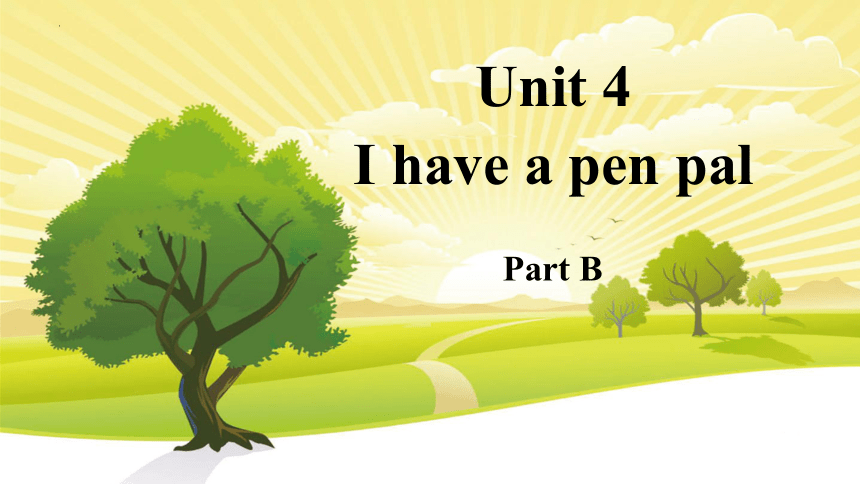 | |
| 格式 | pptx | ||
| 文件大小 | 1.7MB | ||
| 资源类型 | 教案 | ||
| 版本资源 | 人教版(PEP) | ||
| 科目 | 英语 | ||
| 更新时间 | 2023-05-30 17:27:26 | ||
图片预览


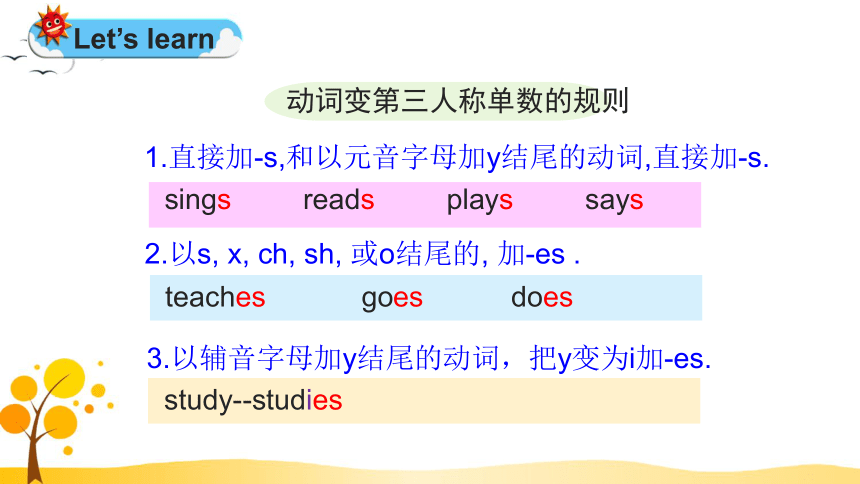
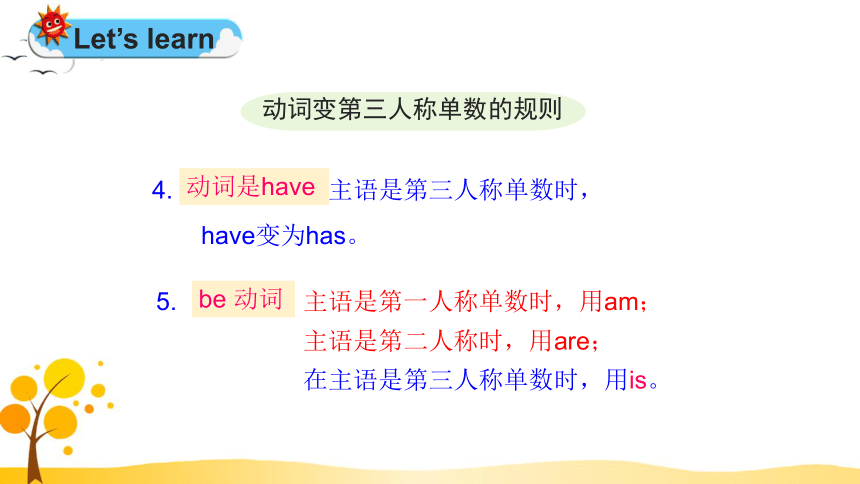
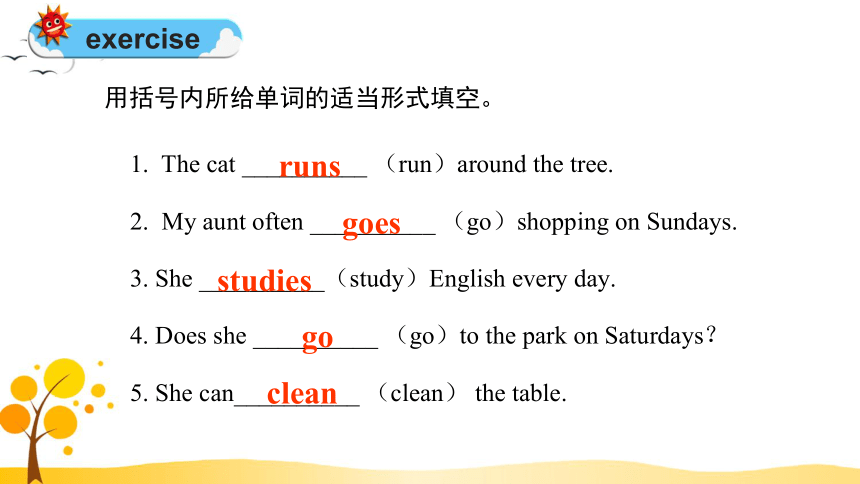
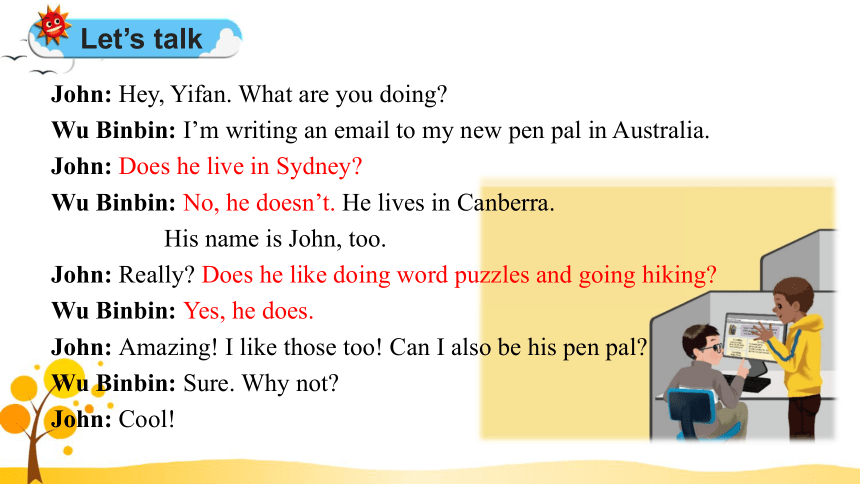
文档简介
(共12张PPT)
Unit 4
I have a pen pal
Part B
cooks Chinese food
studies Chinese
does word puzzles
goes hiking
Let’s learn
Let’s learn
动词变第三人称单数的规则
1.直接加-s,和以元音字母加y结尾的动词,直接加-s.
3.以辅音字母加y结尾的动词,把y变为i加-es.
2.以s, x, ch, sh, 或o结尾的, 加-es .
sings reads plays says
teaches goes does
study--studies
Let’s learn
动词变第三人称单数的规则
主语是第三人称单数时,
have变为has。
5. 主语是第一人称单数时,用am;
主语是第二人称时,用are;
在主语是第三人称单数时,用is。
动词是have
be 动词
exercise
1. The cat __________ (run)around the tree.
2. My aunt often __________ (go)shopping on Sundays.
3. She __________(study)English every day.
4. Does she __________ (go)to the park on Saturdays?
5. She can__________ (clean) the table.
runs
用括号内所给单词的适当形式填空。
goes
studies
go
clean
Let’s talk
John: Hey, Yifan. What are you doing
Wu Binbin: I’m writing an email to my new pen pal in Australia.
John: Does he live in Sydney
Wu Binbin: No, he doesn’t. He lives in Canberra.
His name is John, too.
John: Really Does he like doing word puzzles and going hiking
Wu Binbin: Yes, he does.
John: Amazing! I like those too! Can I also be his pen pal
Wu Binbin: Sure. Why not
John: Cool!
Grammar
—Does he live in Sydney 他住在悉尼吗?
—No, he doesn’t. 不,他不是。
问句用法:这是一个含有实义动词(live)的一般现在时的一般疑问句。
基本结构为:Do/Does+主语+动词原形+其他
当主语是第三人称单数时,要借助助动词does构成一般疑问句,后面的动词用原形。
易错点
提示
Grammar
—Does he like doing word puzzles and going hiking
问句用法:这是一个一般现在时的一般疑问句。
其基本结构为:Do/Does+主语+动词原形+其他
当主语是第三人称单数时,要借助助动词does构成一般疑问句,后面的动词用原形。
______your brother ______a book
A. Does;has B. Does;have C. Do;have
B
Exercise
一、按要求完成句子。
1. Peter does word puzzles every day. (改为一般疑问句)
____________________________________________
2. He likes playing football.(改为一般疑问句)
____________________________________________
Does Peter do word puzzles every day
Does he like playing football
Tips for pronunciation
句子重音是指对句中的某个或某些词加以强调。重读的主要规律:名词、形容词、数词、副词、感叹词、动词(be、have、助动词、情态动词除外)、代词(人称代词、物主代词除外)等一般都要重读,而冠词、介词、连词一般不重读。
Tips for pronunciation
例句:Do you want to learn about robots
你想学习关于机器人的知识吗?
See you on the playground. 在操场上见你。
句子重音是指对句中的某个或某些词加以强调。重读的主要规律:名词、形容词、数词、副词、感叹词、动词(be、have、助动词、情态动词除外)、代词(人称代词、物主代词除外)等一般都要重读,而冠词、介词、连词一般不重读。
Unit 4
I have a pen pal
Part B
cooks Chinese food
studies Chinese
does word puzzles
goes hiking
Let’s learn
Let’s learn
动词变第三人称单数的规则
1.直接加-s,和以元音字母加y结尾的动词,直接加-s.
3.以辅音字母加y结尾的动词,把y变为i加-es.
2.以s, x, ch, sh, 或o结尾的, 加-es .
sings reads plays says
teaches goes does
study--studies
Let’s learn
动词变第三人称单数的规则
主语是第三人称单数时,
have变为has。
5. 主语是第一人称单数时,用am;
主语是第二人称时,用are;
在主语是第三人称单数时,用is。
动词是have
be 动词
exercise
1. The cat __________ (run)around the tree.
2. My aunt often __________ (go)shopping on Sundays.
3. She __________(study)English every day.
4. Does she __________ (go)to the park on Saturdays?
5. She can__________ (clean) the table.
runs
用括号内所给单词的适当形式填空。
goes
studies
go
clean
Let’s talk
John: Hey, Yifan. What are you doing
Wu Binbin: I’m writing an email to my new pen pal in Australia.
John: Does he live in Sydney
Wu Binbin: No, he doesn’t. He lives in Canberra.
His name is John, too.
John: Really Does he like doing word puzzles and going hiking
Wu Binbin: Yes, he does.
John: Amazing! I like those too! Can I also be his pen pal
Wu Binbin: Sure. Why not
John: Cool!
Grammar
—Does he live in Sydney 他住在悉尼吗?
—No, he doesn’t. 不,他不是。
问句用法:这是一个含有实义动词(live)的一般现在时的一般疑问句。
基本结构为:Do/Does+主语+动词原形+其他
当主语是第三人称单数时,要借助助动词does构成一般疑问句,后面的动词用原形。
易错点
提示
Grammar
—Does he like doing word puzzles and going hiking
问句用法:这是一个一般现在时的一般疑问句。
其基本结构为:Do/Does+主语+动词原形+其他
当主语是第三人称单数时,要借助助动词does构成一般疑问句,后面的动词用原形。
______your brother ______a book
A. Does;has B. Does;have C. Do;have
B
Exercise
一、按要求完成句子。
1. Peter does word puzzles every day. (改为一般疑问句)
____________________________________________
2. He likes playing football.(改为一般疑问句)
____________________________________________
Does Peter do word puzzles every day
Does he like playing football
Tips for pronunciation
句子重音是指对句中的某个或某些词加以强调。重读的主要规律:名词、形容词、数词、副词、感叹词、动词(be、have、助动词、情态动词除外)、代词(人称代词、物主代词除外)等一般都要重读,而冠词、介词、连词一般不重读。
Tips for pronunciation
例句:Do you want to learn about robots
你想学习关于机器人的知识吗?
See you on the playground. 在操场上见你。
句子重音是指对句中的某个或某些词加以强调。重读的主要规律:名词、形容词、数词、副词、感叹词、动词(be、have、助动词、情态动词除外)、代词(人称代词、物主代词除外)等一般都要重读,而冠词、介词、连词一般不重读。
同课章节目录
